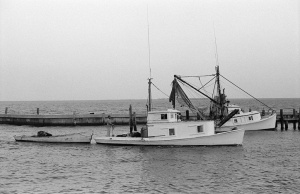One might well ask me why I spent much of the last eight years working on a book about old boats. Kenneth Grahame answered that question one way long ago in the children’s classic, The Wind in the Willows: “There is nothing—absolutely nothing—half so much worth doing as simply messing about in boats.”
A lot of people would agree with that, but it wasn’t the “messing about” in boats that drew me Down East time and again. The stories were the draw. I spent time in a lot of living rooms listening to stories about fishermen and boatbuilders and their boats. I was amazed at how easily people could recall intimate details about the boats—who built them, where, when, who they were sold to, what happened to them. The stories were what kept me coming back.

Wasted Wood, Atlantic, 1985
I asked David Smith of Atlantic why his father’s boat was called Wasted Wood. He said: “The Wasted Wood was named the David M. and that was my name. But they always called it the Wasted Wood because she had great big timbers. Will Mason wasted a lot of wood when he built that boat. The name just stuck, that’s what it was always called. It sounds funny when you say the name of the boat was the Wasted Wood. People kind of laugh. But growing up, that was the name of it; there wasn’t anything funny about it.”
Some of the stories had little to do with the boats and more to do with the person himself or herself, with the way they looked at things or with their sense of humor. Crab-house owner and born story-teller John Paul Lewis of Davis told me this delightful tale about a man from Atlantic long ago: “A lot of our boats went to Norfolk. One man [had a] boat named the Louise, and she was built in the early twenties, probably. But he went to Norfolk and kept her tied up to the Atlantic Ice Company, right where the ferry crossed from Portsmouth to Norfolk, East Main St. And I’d take shrimp there to be frozen in the fall and he got to be a very good friend of mine. And he stayed in Norfolk twenty years on the Louise. He kept her up and painted her. And when he came back to Atlantic he walked across the road to his wife’s house, and said, ‘What’re we having for supper?'”
The late Milan Willis of Atlantic said that he had joined the Navy during the Second World War. “I didn’t go in because I was patriotic,” he said. “I went in because I was digging clams for 40 cents a bushel and I thought the Navy would be better, which was a mistake. The clamming was better.”
J.M. Brown of Gloucester responded to my question about the difficulty of building a boat alone in this way. “It’s hard to do much boatwork by yourself,” he said, with a twinkle in his eye. “You need someone to hold the end of something, you know.”
